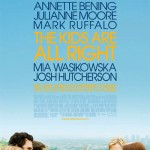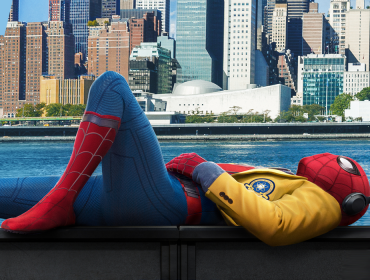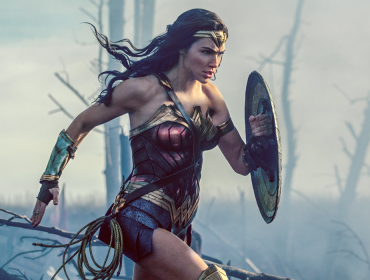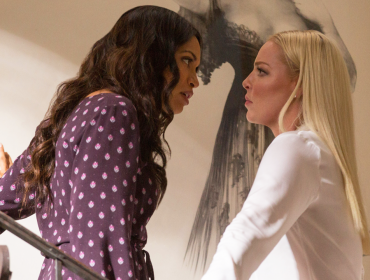San Francisco — I recently participated in a roundtable interview at The Ritz Carlton with fellow journalists from other Bay area media outlets including “The Examiner,” “7X7 magazine,” “SF Station,” and “Pop Sugar” to interview actress Annette Bening (The American President, American Beauty) and director Lisa Cholodenko (High Art, Laurel Canyon) regarding the film The Kids Are All Right. The independent film, which premiered at the Sundance Film Festival, is a straight-shooting film about a lesbian couple who have two children. Conceived through artificial insemination, the children decide to seek out their biological father, which puts their seemingly happy family on a collision course.
Here are a few questions that were posed to Bening and Cholodenko. (The Chic Spy’s questions are in orange)
Interview with actress Annette Bening who plays Nic:
Question: There was a recent article about the controversy of gay actors playing straight roles. I was wondering about your perspective on having straight actors play queer roles and what you think about the article and the response it got?
Answer: I thought it was real unnecessary, I guess that’s how I would put it. It was really unfortunate. I think in an ideal role, everybody plays everything. As an actor that’s your goal. When I was at ACT here in San Francisco it was all about that, it was all about transformation and using your imagination. In theory, your only limitations are within your own imagination. So, I feel really strongly that people should be able to play what they can play. And it’s really a question of the work and the talent in terms of how convincing any of us are. We’re always playing things that we aren’t; you don’t have to have lived that life in order to imagine it. The whole basis of the imaginative world is fiction. Of course, as an actor I feel particularly protective of other actors.
Q: The character of Nic seems very structured and I was wondering where does that come from; does that come from the core with her relationship with Jules (Julianne Moore) and how it changes over time with their children?
A: I heard Lisa [Cholodenko], who wrote it with Stuart Blumberg, talk about that last night. She saw Nic as somebody who was more controlled and controlling. There’s some structure to her life and I think that it is a virtue for her in many ways and for the family. I think there is a down side. I think it serves the story. I don’t think she is a control freak. I don’t think she is over the top, but I think she is a physician, she’s a mom, a partner, and there’s a certain satisfaction to order for her that seemed to be there in the story.
Q: As a mother, what have you found to be universal in the construct of the family?
A: When you ask me something like that I feel I should say something profound about motherhood but I don’t know that I can do that. I wish I could. I like to think maybe, that we are motivated by our intense love for our kids and I think most people feel that way. I try to bring that to what I am doing when I am playing a mom. And I suppose not all the roles I have played have been great moms. I think with mother and child the whole issue of motherhood is very different in “The Kids Are All Right” … this is a much more practical mom who is very much involved and devoted to her kids and getting ready to let one of them go off to college.
Q: There are fewer roles for mature women in Hollywood. Do you feel there are more opportunities in independent films, and why or why not?
A: Probably, if one assumes that the market place is what is dominating the studio system, which I suppose has always been true, that’s not new. It’s kind of tougher than ever right now. The culture in general reflects that, not only in my business but also in journalism and in publishing. It’s tough right now, art versus commerce. Commerce is winning big time. So that’s true, but from when I started if I look back there’s always been more stories outside the mainstream but not always. It sort of depends on the director. Sometimes a director can go to a studio and say, “Hey I want this person to make the picture.” So it’s always this kind of uncertain set of circumstances, which determine whether a movie gets financing or not. They’re scrambling to get these movies made. The producers of these kinds of movies have to be so clever these days or now its happening more and more that people from other parts of the business world, who have made lots of money, come to movies and often they have very serious people who want to make movies of substance. That’s why they are involved. What gets these movies made is always tentative and a lot of people that are veteran directors that you and I would know and respect are having a difficult time getting movies made.
Interview with director Lis Cholodenko:
Question: This film addresses a variety of topics including fidelity, same-sex marriage, and artificial insemination. What message do you hope viewers take away from the film? For me what resonated most was family bonding?
Answer: I think in a way its kind of a family values movie. I certainly don’t advocate people staying in marriages that are horribly unhappy, contentious, or stressful; stressful to the point they have a negative impact on the kids. But I think that I wanted to in part make a film that was an accurate portrayal of what it takes to be in a long term relationship and keep your family intact, and its not Leave It To Beaver. It’s complicated and it’s shifting sands, but in the end there’s something that’s really good, a kind of strengthening and working through problems.
Question: I am curious about Mark Ruffalo’s character. He is such a sympathetic character in a lot of ways. As a viewer, no matter what he was doing, even though he is sort of tearing this family apart, you still sort of wish in the end something is going to happen … he would ride up on his motorcycle. I am curious, when you were creating his character, how did you decide on these pinnacle moments?
Answer: I think at the time, when you have the basic idea you have to figure out what stays and what goes. You write and maybe at a certain point in the writing we had long deliberations and he was a more favored character and he took 20 pages instead of five to figure out what he was going to do. Then we said, you know what lets get this show on the road; what’s the plot and where are we going with this? You don’t really know where it’s going to go and slowly this story emerges. How can we get there and say enough about him to give him the due diligence he needs to be sympathetic to the character. There were different endings from the corneous to the kind of brutal and we felt like any real rap-it-up ending with him where he gets the door slammed in his face, then five minutes later he shows up and there is a tearful hug, was something that was enormously contrived — it just would have felt wrong.
Release date: July 9, 2010
(Image credits: images.yahoo.com and courtesy of Focus Features)







